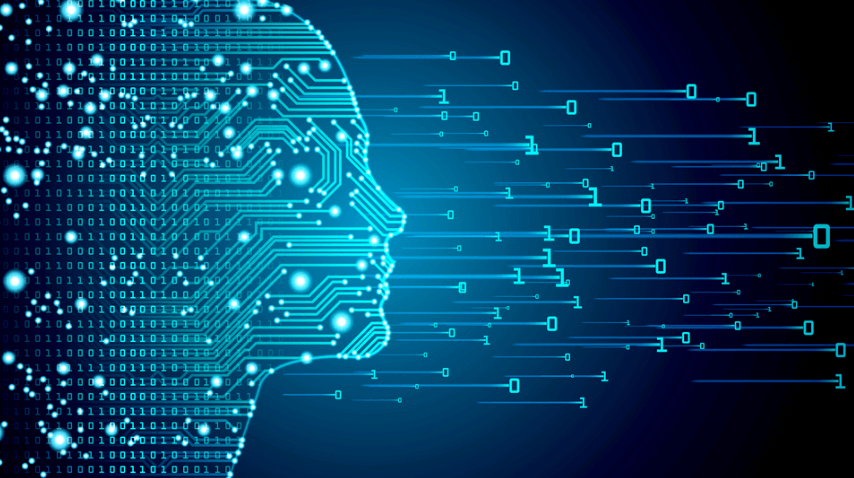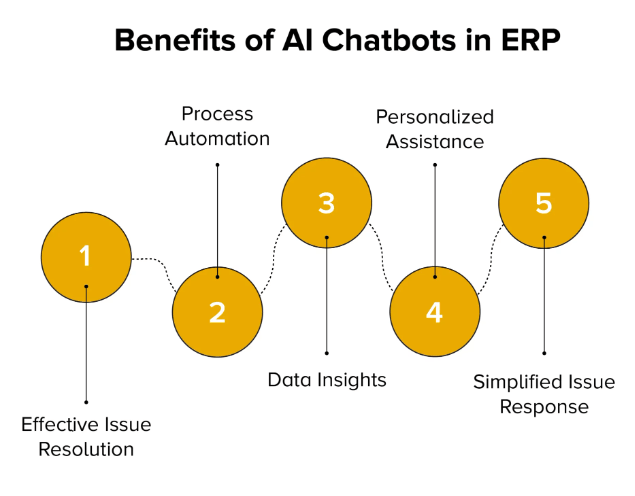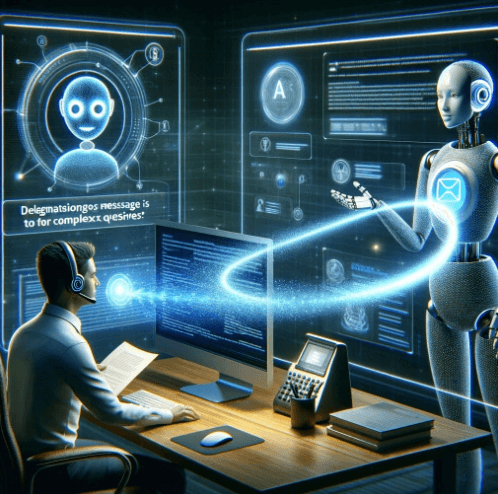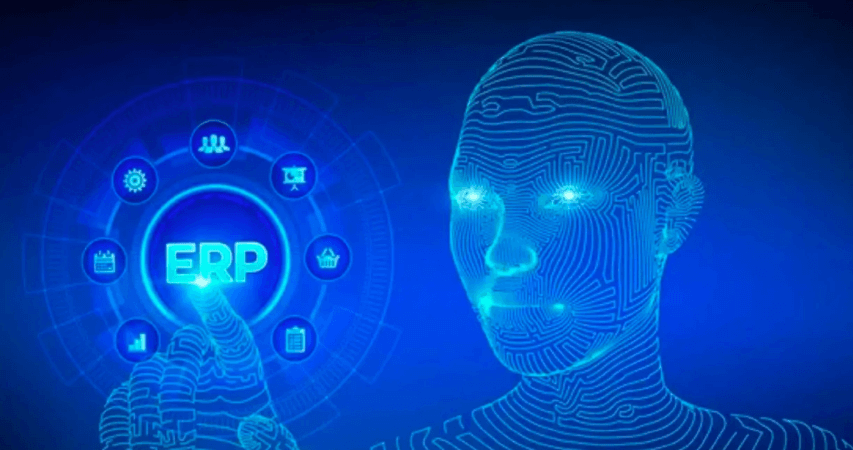In today’s fast-paced business landscape, efficiency, agility, and intelligent decision-making are paramount for enterprises striving to stay ahead of the curve. Enter Enterprise Resource Planning (ERP) systems, the backbone of modern organizations, streamlining operations across various departments. However, as technology advances and consumer expectations evolve, traditional ERP solutions often find themselves grappling with the need for enhanced user experiences and seamless integration with emerging technologies.
Enter Artificial Intelligence (AI) chatbots, the game-changers in the realm of digital interaction. These intelligent conversational agents have revolutionized customer service, internal communications, and even personal productivity. Now, the convergence of ERP systems and AI chatbots presents a new frontier in enterprise management – one that promises to redefine how organizations operate, communicate, and innovate.

Benefits of Integrating AI Chatbots with ERP Systems
Integrating AI chatbots with ERP (Enterprise Resource Planning) systems offers numerous benefits for organizations across various industries. These benefits extend beyond simple automation, providing transformative advantages that enhance efficiency, productivity, and customer satisfaction. Here are some of the key benefits of integrating AI chatbots with ERP systems:
1.Enhanced Efficiency:
AI chatbots streamline and automate routine tasks within ERP systems, such as data entry, report generation, and order processing. By handling these tasks more efficiently than human employees, AI chatbots free up valuable time and resources, allowing employees to focus on more strategic activities.
2.Improved Accessibility:
AI chatbots provide users with instant access to ERP data and functionality through natural language interfaces. This accessibility enables employees at all levels of the organization to retrieve information, perform tasks, and make informed decisions quickly and easily, without the need for specialized training or technical expertise.
3.24/7 Availability:
Unlike human employees, AI chatbots are available round the clock, providing uninterrupted support and assistance to users across different time zones and geographic locations. This 24/7 availability ensures that critical business operations can continue without interruption, even outside of regular business hours.
4.Personalized User Experience:
AI chatbots can personalize interactions based on user preferences, past behavior, and historical data stored within the ERP system. By delivering tailored recommendations, insights, and assistance, AI chatbots enhance the user experience and foster stronger relationships with customers, suppliers, and other stakeholders.
5.Real-time Insights:
AI chatbots can analyze vast amounts of data in real-time, extracting actionable insights and trends that drive better decision-making within the organization. By providing access to up-to-date information and analytics, AI chatbots empower employees to respond quickly to changing market conditions, customer demands, and competitive threats.
6.Scalability:
AI chatbots can scale effortlessly to handle growing volumes of user interactions and data within ERP systems. Whether supporting a small team or a large enterprise, AI chatbots can adapt to fluctuating workloads and user demands without compromising performance or quality of service.
7.Cost Savings:
By automating repetitive tasks and streamlining processes, AI chatbots help organizations reduce operational costs and increase efficiency. These cost savings can result from reduced labor costs, improved resource utilization, and fewer errors and inefficiencies associated with manual data entry and processing.
8.Enhanced Customer Service:
AI chatbots can provide personalized assistance and support to customers, suppliers, and other external stakeholders interacting with the organization’s ERP system. By answering inquiries, resolving issues, and processing requests in a timely and efficient manner, AI chatbots enhance the overall customer service experience and foster greater customer satisfaction and loyalty.

Difficulty of Integrating AI Chatbots with ERP Systems
Integrating AI chatbots with ERP (Enterprise Resource Planning) systems poses several challenges that organizations must address to ensure a successful implementation. While the benefits of such integration are considerable, overcoming these difficulties requires careful planning, coordination, and expertise. Here are some of the key challenges associated with integrating AI chatbots with ERP systems:
1.Data Integration:
ERP systems typically store vast amounts of structured and unstructured data from various business functions. Integrating AI chatbots requires seamless access to this data, which may be stored in different formats, databases, or locations. Achieving effective data integration involves mapping data fields, ensuring data consistency, and overcoming compatibility issues between disparate systems.
2.Compatibility Issues:
AI chatbots often utilize modern technologies and programming languages that may not be fully compatible with legacy ERP systems. Ensuring compatibility between the chatbot platform and the ERP system may require custom development, middleware integration, or upgrades to existing software and infrastructure.
3.Natural Language Understanding:
AI chatbots rely on natural language processing (NLP) to understand user queries and extract relevant information from ERP databases. Developing robust NLP capabilities tailored to the specific terminology and context of ERP systems can be challenging, particularly when dealing with industry-specific jargon or complex business processes.
4.Security Concerns:
ERP systems contain sensitive business data, including financial records, customer information, and proprietary intellectual property. Integrating AI chatbots raises concerns about data security and privacy, particularly regarding access controls, encryption, and compliance with regulations such as GDPR and HIPAA. Ensuring the secure transmission and storage of data is essential to protect against potential breaches or unauthorized access.
5.Scalability:
As organizations grow and evolve, the volume and complexity of data processed by ERP systems also increase. Ensuring that AI chatbots can scale seamlessly to handle growing user interactions and data volumes requires careful planning and infrastructure investment. Scalability considerations include optimizing performance, managing system resources, and accommodating spikes in demand without compromising service quality.
6.User Adoption and Training:
Introducing AI chatbots into the workplace requires educating employees about their capabilities and how to interact with them effectively. Resistance to change, lack of familiarity with AI technologies, and concerns about job displacement can hinder user adoption and necessitate comprehensive training programs. Ensuring that users feel comfortable and confident using AI chatbots is crucial to maximizing their effectiveness and acceptance within the organization.
7.Maintenance and Updates:
AI chatbots are not static entities; they require continuous monitoring, maintenance, and updates to remain effective over time. Integrating AI chatbots with ERP systems adds another layer of complexity to the maintenance process, as changes to the ERP system or underlying data structures may impact the chatbot’s functionality. Implementing robust maintenance procedures and version control mechanisms is essential to ensure the ongoing reliability and performance of AI chatbots within the ERP environment.

How ERP AI Chatbots Work
ERP AI chatbots leverage advanced technologies such as natural language processing (NLP) to understand user queries and extract relevant information from ERP databases. They facilitate seamless communication between users and ERP systems, enabling users to perform tasks and retrieve information more efficiently.
Use Cases of ERP AI Chatbots
The applications of ERP AI chatbots span across various functional areas within an organization. For instance, they can assist with inventory management by providing real-time updates on stock levels and processing orders. Similarly, in customer support, AI chatbots can address common queries and escalate complex issues to human agents as needed.
Challenges and Considerations
Despite their numerous benefits, the integration of AI chatbots with ERP systems also presents certain challenges and considerations. Data security and privacy concerns are paramount, given the sensitive nature of the information handled by ERP systems. Moreover, integrating AI chatbots with existing ERP infrastructure may require significant effort and resources.
Future Trends and Developments
Looking ahead, the future of ERP AI chatbots appears promising, with ongoing advancements in AI technology and its integration with other emerging technologies such as machine learning and blockchain. These developments are poised to further enhance the capabilities of ERP AI chatbots and their impact on business processes.

Frequently Asked Questions For ERP AI Chatbots
1.Are ERP AI chatbots suitable for all types of businesses?
While ERP AI chatbots can benefit a wide range of industries, their suitability depends on factors such as the complexity of business processes and the organization’s readiness for digital transformation.
2.How can businesses ensure the security of data handled by ERP AI chatbots?
Implementing robust encryption protocols, access controls, and regular security audits are essential measures to safeguard sensitive data handled by ERP AI chatbots.
3.What are some common challenges organizations may encounter when integrating ERP AI chatbots?
Integration complexities, data migration issues, and the need for extensive training are some of the common challenges organizations may face when integrating ERP AI chatbots into their existing systems.
4.Can ERP AI chatbots replace human employees?
While ERP AI chatbots can automate routine tasks and handle simple queries, they are not intended to replace human employees. Instead, they complement human workforce by augmenting their capabilities and improving overall efficiency.
5.What are some emerging trends in the field of ERP AI chatbots?
Emerging trends include the integration of voice recognition capabilities, personalized user experiences, and proactive analytics to anticipate user needs and preferences.

conclusion
The integration of AI chatbots with ERP systems represents a significant milestone in the evolution of modern business processes. By seamlessly merging artificial intelligence capabilities with the robust functionalities of ERP systems, organizations stand to reap numerous benefits, ranging from enhanced operational efficiency to improved customer satisfaction. As businesses continue to adapt to an increasingly digital landscape, the synergy between AI chatbots and ERP systems offers a promising avenue for driving innovation, streamlining operations, and staying competitive in today’s dynamic marketplace. Embracing this transformative technology presents opportunities for organizations to optimize resource utilization, foster greater collaboration, and ultimately, achieve their strategic objectives with greater agility and effectiveness. As we look towards the future, the integration of AI chatbots with ERP systems holds immense potential to redefine the way businesses operate, communicate, and deliver value to their stakeholders.








